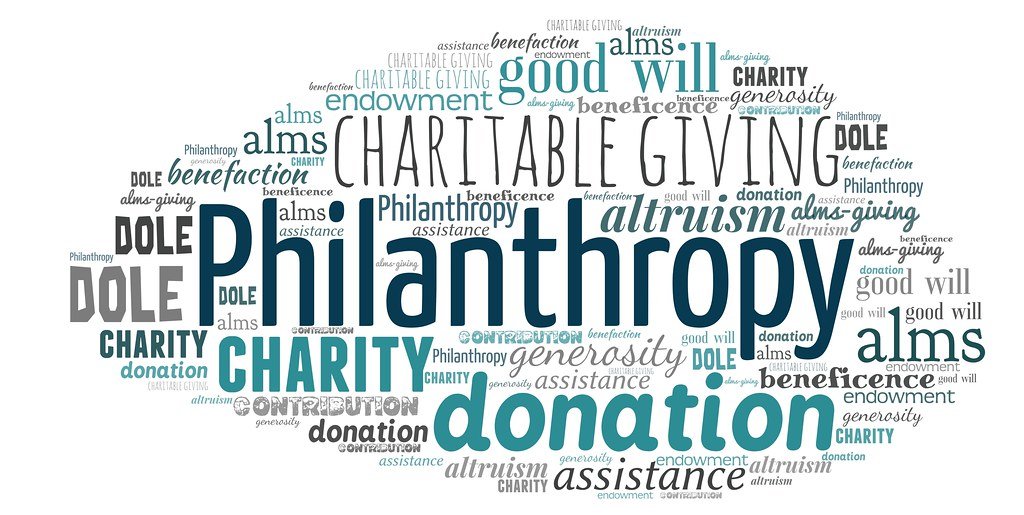Philanthropy: Nurturing Compassion, Catalyzing Change

Philanthropy, the practice of promoting the welfare of others through charitable giving and social action, lies at the heart of human compassion and solidarity. In this article, we explore the transformative power of philanthrop, examining its role in addressing societal challenges, fostering social change, and enriching the lives of individuals and communities around the world.

The Evolution of Philanthropy
Throughout history, philanthropy has taken many forms, reflecting the values, priorities, and aspirations of different cultures and societies. From ancient civilizations to modern-day philanthropists, individuals and organizations have sought to alleviate suffering, advance knowledge, and promote social justice through acts of generosity and service. While the methods and motivations of philanthrop may vary, its underlying ethos of compassion and altruism remains constant.
Types of Philanthropy: From Charity to Systemic Change
Philanthropy encompasses a wide range of activities, from traditional acts of charity such as providing food, shelter, and medical care to those in need, to more strategic initiatives aimed at addressing root causes of social injustice and inequality. While charity focuses on meeting immediate needs, systemic philanthropy seeks to effect lasting change by addressing underlying systemic issues such as poverty, discrimination, and environmental degradation. Both forms of philanthrop play a vital role in creating a more just and equitable world.
The Impact of Philanthropy: Transforming Lives and Communities
The impact of philanthropy is profound and far-reaching, touching the lives of individuals and communities in myriad ways. From funding education and healthcare initiatives to supporting environmental conservation and human rights advocacy, philanthrop has the power to catalyze positive change and uplift those who are marginalized or disenfranchised. By investing in programs and initiatives that promote social inclusion, economic opportunity, and environmental sustainability, philanthropists can help build a more resilient and compassionate society for future generations.
Challenges and Opportunities in Philanthropy
Despite its potential for good, philanthropy also faces a number of challenges, including issues of accountability, transparency, and effectiveness. Questions about the impact and sustainability of philanthropic initiatives, as well as concerns about the concentration of wealth and power in the hands of a few, underscore the need for greater scrutiny and accountability within the philanthropic sector. Additionally, disparities in access to philanthropic resources and opportunities highlight the importance of ensuring that philanthropy is inclusive and equitable.

The Future of Philanthropy: Innovation and Collaboration
As we look to the future, the landscape of philanthrop is evolving in response to changing social, economic, and environmental realities. Increasingly, philanthropists are embracing innovative approaches such as impact investing, social entrepreneurship, and cross-sector collaboration to address complex challenges and drive sustainable change. By leveraging their resources, expertise, and networks, philanthropists have the potential to amplify their impact and catalyze transformative solutions to some of the world’s most pressing problems.
Embracing the Spirit of Giving
In conclusion, philanthropy embodies the inherent human impulse to care for one another and work towards a more just and compassionate world. Whether through acts of kindness and generosity in our daily lives or through more strategic and systematic approaches to social change, each of us has the power to make a difference through philanthrop. By nurturing the spirit of giving and embracing our shared humanity, we can create a brighter, more equitable future for all.
Exploring the Pros and Cons of Philanthropy: Balancing Impact and Accountability
Philanthropy, the act of giving for the betterment of others, is a powerful force for positive change in society. However, like any human endeavor, it comes with its own set of advantages and disadvantages. In this article, we delve wdbos into the nuanced landscape of philanthropy, examining both its strengths and weaknesses in shaping the world we live in.

Advantages of Philanthropy:
- Addressing Social Issues: One of the primary benefits of philanthrop is its ability to address pressing social issues and meet the needs of marginalized communities. Through charitable giving and strategic investments, philanthropists can fund initiatives that provide food, shelter, healthcare, education, and other essential services to those in need.
- Promoting Innovation and Creativity: Philanthropy encourages innovation and creativity by providing funding and support for groundbreaking ideas and initiatives. By investing in research, technology, and social entrepreneurship, philanthropists can catalyze transformative solutions to complex challenges and drive positive change.
- Fostering Collaboration and Partnership: Philanthrop has the potential to foster collaboration and partnership among diverse stakeholders, including governments, nonprofits, businesses, and communities. By bringing together different perspectives, resources, and expertise, philanthropic initiatives can leverage collective impact and achieve greater scale and sustainability.
- Empowering Individuals and Communities: Philanthrop empowers individuals and communities to take control of their own destinies and build brighter futures for themselves and their families. By providing opportunities for education, economic empowerment, and civic engagement, philanthropy can break the cycle of poverty and promote social mobility and inclusion.
Disadvantages of Philanthropy:
- Unequal Distribution of Resources: Philanthropy can exacerbate existing inequalities by concentrating resources and decision-making power in the hands of a few wealthy individuals or organizations. This unequal distribution of resources can perpetuate systems of privilege and marginalization, limiting the impact of philanthrop on addressing root causes of social injustice and inequality.
- Lack of Accountability and Transparency: Philanthrop faces challenges related to accountability and transparency, as donors may have limited oversight or accountability mechanisms in place to ensure that their funds are used effectively and ethically. Without robust monitoring and evaluation systems, philanthropic initiatives may fail to achieve their intended outcomes or address the needs of the communities they aim to serve.
- Potential for Influence and Agenda-Setting: Philanthropy can wield significant influence over public policy, social norms, and public discourse, raising concerns about undue influence and agenda-setting by wealthy donors or philanthropic organizations. This influence may undermine democratic governance and grassroots activism, leading to a concentration of power and influence in the hands of a privileged few.
- Short-Term Focus and Band-Aid Solutions: Philanthrop sometimes prioritizes short-term interventions and band-aid solutions over long-term systemic change, leading to limited impact and sustainability. By addressing symptoms rather than root causes of social problems, philanthropic initiatives may fail to address underlying structural inequalities and perpetuate cycles of dependency and aid reliance.
Conclusion: Striving for Ethical and Impactful Philanthropy
In conclusion, philanthropy is a complex and multifaceted endeavor with both advantages and disadvantages. While it has the potential to drive positive change and improve the lives of millions, it also faces challenges related to accountability, transparency, and equity. Moving forward, it is imperative for philanthropists, policymakers, and civil society stakeholders to work together to address these challenges and ensure that philanthrop is conducted ethically, responsibly, and with a focus on maximizing impact and empowering those most in need. By harnessing the transformative power of philanthrop while remaining vigilant to its potential pitfalls, we can create a more just, equitable, and compassionate world for all.
Read More Article About “Intel Core i9-14900K: Unleashing the Most Powerful PC Processor Ever“


Leave a Comment